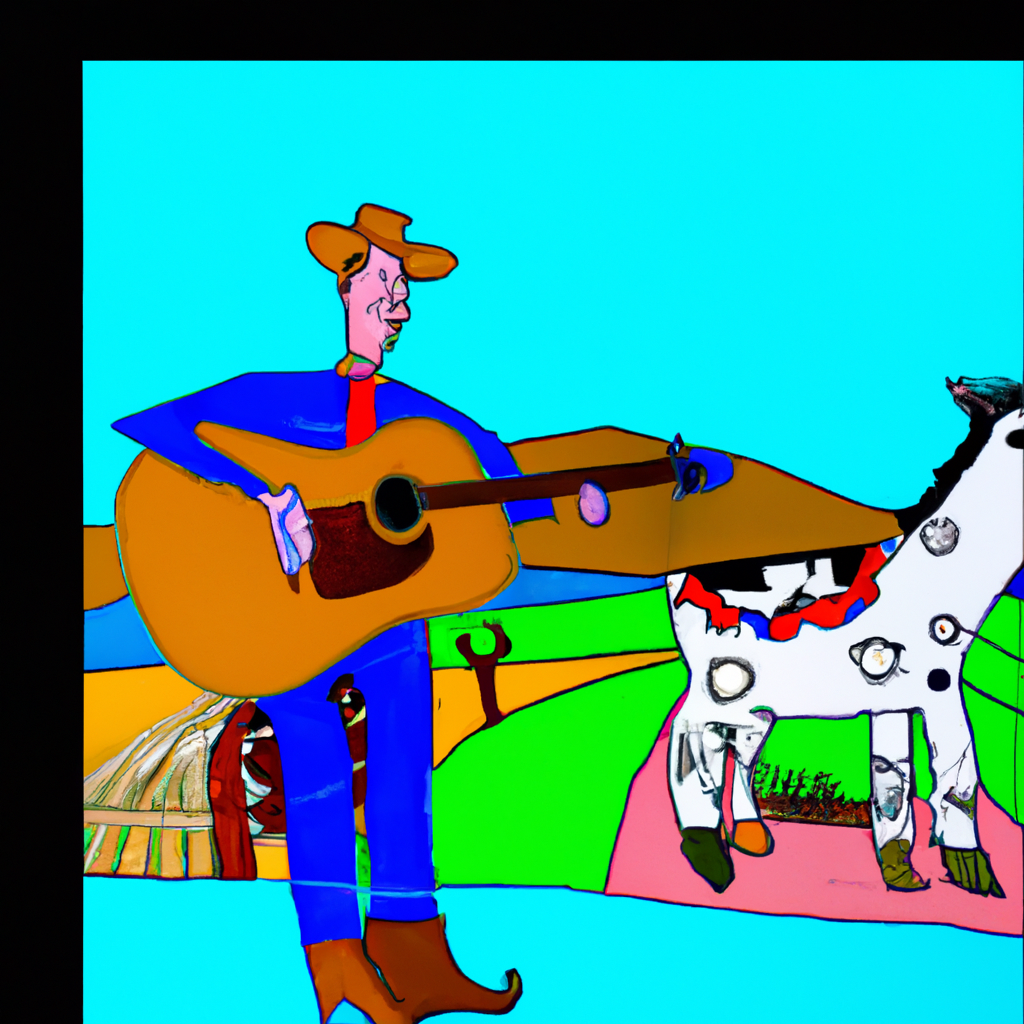
I. Introduction
Country music is a uniquely American genre of music that has evolved over time to become one of the most popular music genres in the United States. The roots of country music can be traced back to the late 19th century, when settlers from the British Isles brought with them their instruments and musical traditions. These musical traditions blended with the musical traditions of African Americans, resulting in the creation of new styles of music, including blues, jazz, and country.
The first recognized country music hit was “Wreck of the Old 97,” by Vernon Dalhart, in 1924. This song and others like it were played on the radio and at barn dances, and helped to establish country music as a staple in American culture. Country music became a commercial success in the 1940s, when it began to be heavily promoted and marketed as a distinct musical genre. It was during this time that country music legends such as Hank Williams, Patsy Cline, and Johnny Cash emerged.
Country music has continued to evolve over the years, with new sub-genres emerging such as outlaw country, country rock, and contemporary country. Today, country music is enjoyed by millions of people in the United States and around the world. It has become a staple in American life, and can be heard on the radio, at concerts, in bars and restaurants, and even in movies and television shows.
Despite its enormous popularity, country music has often been regarded as the music of the “common man.” Its lyrics often focus on themes such as love, heartbreak, and hard work, and provide a glimpse into the everyday lives of working-class Americans. Many view country music as a reflection of American values and lifestyle, as it often presents a traditional and nostalgic view of American life.
In conclusion, country music has a rich history that is deeply rooted in American culture and society. It has evolved over time to become a major player in the entertainment industry, with a massive following that spans generations. Whether it’s singing along to a classic country tune or discovering new artists and songs, country music continues to be an important aspect of American culture.

II. Country Music and American Society
Country music has always been a reflection of American values and lifestyle. From the earliest days of country music, the genre has been characterized by its focus on the struggles and triumphs of everyday people. One of the reasons for the popularity of country music in America is that it speaks to a broad swath of the population. The themes of country music – love, loss, hard work, and patriotism – resonate with people across race, class, and regional boundaries.
Country music has also been known for its portrayal of working-class life. From the rural farms to the urban factories, country music has always had a special connection with the blue-collar workers of America. Songs about working hard for a living, taking pride in one’s work, and finding meaning in a job well done are staples of the country music genre. Country music has celebrated the working-class experience in a way that few other genres have, and that has helped it stay relevant to American society.
In addition to its focus on the working-class experience, country music has also been a symbol of patriotism. Country music has always had a deep respect for the flag, and for the country that it represents. From “The Star-Spangled Banner” to “God Bless America,” country music has been a powerful force in shaping American patriotism. The genre has celebrated American history and traditions, as well as the men and women who have fought to defend them.
All of these themes have helped make country music an integral part of American culture and society. From the earliest days of the genre to the present day, country music has spoken to the heart of the American experience. It has celebrated the things that make America great – hard work, family, community, and patriotism – and it has done so in a way that is uniquely American. Whether you’re a fan of the genre or not, there is no denying that country music has had a profound impact on American society.
III. Country Music and the Entertainment Industry
In recent years, country music has become a powerhouse in the music industry, with millions of record sales and sold-out concerts around the world. The emergence of superstars like Garth Brooks, Shania Twain, and Taylor Swift has further cemented country music’s place in popular culture.
Country music has also had a significant impact on other genres of music, particularly pop and rock. It’s not uncommon for pop songs to feature elements of country music or for rock bands to incorporate country influences into their music. This trend has helped to blur the lines between genres and has expanded the audience for country music.
Another way in which country music has impacted the entertainment industry is through its role in promoting new artists and supporting established musicians. Many country music festivals and award shows have dedicated stages or categories for up-and-coming artists, providing them with exposure and opportunities to break into the industry. Furthermore, established country singers like Dolly Parton and Reba McEntire serve as mentors and advocates for younger artists, sharing their knowledge and experience to help them succeed.
Country music has also been a driving force behind the success of other entertainment industries, such as film and television. Many popular movies and TV shows feature country music soundtracks or have storylines centered around country music themes. For example, the popular TV series Nashville explored the lives of country music singers and the industry that surrounds them.
In summary, country music has not only achieved massive success in the music industry but has also impacted other areas of entertainment. Its influence on other music genres and pop culture has expanded the audience for country music beyond its traditional fan base, while its support for new artists and established musicians has helped to keep the industry thriving. Country music is poised to continue to shape and influence the entertainment industry for years to come.
IV. Country Music and Politics
Country music has long been associated with conservative values and ideologies in the United States. It has been used extensively in political campaigns and rallies by candidates across the political spectrum. One of the most notable examples of this was in 1992 when Bill Clinton, a Democratic candidate, famously played “Don’t Stop” by Fleetwood Mac at his rally. However, in recent years, country music has become increasingly associated with conservative politics, particularly the Republican Party.
Many Republican politicians, including former President Donald Trump, have used country music as a theme of their campaigns, with songs by artists such as Lee Greenwood’s “God Bless the USA” and Toby Keith’s “Courtesy of the Red, White, and Blue” serving as unofficial anthems for conservative politics. These songs often focus on American values, such as patriotism, hard work, and a love for country.
The intersection of country music and conservative politics has been a subject of much debate in recent years. While some argue that country music reflects the values and concerns of a large segment of the American population, others consider it a tool for promoting right-wing politics and ideologies. The conservative themes present in many country songs have been criticized by those who see them as exclusionary or outdated.
The use of country music in politics has also brought about a backlash against the genre. Many progressive and liberal Americans view country music as a symbol of conservative politics and resent the genre’s close association with the Republican Party. This has led to some artists distancing themselves from the genre’s associations with conservative politics.
In conclusion, the relationship between country music and politics is a complex one, with the genre serving as a reflection of American values and lifestyle while also being used for political purposes. Its association with conservative politics has both benefitted and harmed the genre’s reputation, with many Americans disassociating themselves from the genre due to its political affiliations. Nonetheless, country music remains a beloved and influential genre in American culture, with a loyal following among music fans across the political spectrum.
V. The Future of Country Music in America
The sound and message of country music have evolved significantly over the years, and this trend is expected to continue in the future. Modern country music incorporates a diverse set of sounds and influences from pop, rock, and hip-hop, and the genre has become more inclusive and open to experimentation.
The technological advancements of the 21st century have transformed the music industry and have played a significant role in the development of country music. Streaming services like Spotify and Apple Music have made country music more accessible to audiences around the world, and social media has given artists a platform to connect with their fans and promote their music. Technological advancements have also given rise to new sub-genres within country music, such as “bro-country” and “hick-hop,” which have gained immense popularity among younger audiences.
However, changing demographics could have a significant impact on the future of country music in the US. The genre has historically been associated with rural, working-class communities, but as America becomes more diverse and urbanized, the popularity of country music among younger and more diverse audiences has declined. With the rise of other popular genres like hip-hop and pop, country music will have to adapt to remain relevant to future generations.
Despite these challenges, country music remains a vital force in American culture and society. The genre has always reflected the values and aspirations of the American people, and its ability to tell authentic and emotional stories has made it a beloved and enduring musical form. The future of country music will depend on the ability of the genre to continue evolving, embrace new audiences, and stay true to its roots.
In conclusion, the impact of country music on American culture and society cannot be overstated. The genre has defined and reflected the essence of American life for generations, and continues to shape our culture in meaningful ways. The future of country music is bright, but it is necessary for the genre to stay true to its roots while adapting to the changing times. As long as country music continues to evolve, it will remain a beloved and integral part of American musical culture.
VI. Conclusion
Country music has had a profound impact on American culture and society, capturing the essence of the country’s traditional values and heritage. The genre emerged as a response to the struggles of rural America and has since become a symbol of patriotism, reflecting the values of hard work, family, and faith that are deeply ingrained in the American way of life.
As the popularity of country music grew, it became an increasingly important part of the entertainment industry, influencing popular culture and inspiring other musicians across various genres. But the genre has also been politically charged, with many artists and their songs aligning themselves with conservative politics, which has occasionally led to controversy and backlash.
The future of country music is uncertain, as the genre continues to evolve and adapt to an ever-changing world. With the rise of technology, streaming services, and changing demographics, the genre is poised to transform once again. In spite of these changes, however, country music will always be a symbol of American patriotism and a celebration of the values and traditions of the American people.
In conclusion, country music has been an integral part of American culture and society for many years. Its impact on the entertainment industry and popular culture at large cannot be overstated, and its influence on the country’s politics and societal norms have been significant. As the genre continues to evolve and adapt, it is poised to remain a powerful and enduring expression of the American experience, celebrating the rich and diverse cultural heritage of this great nation.



